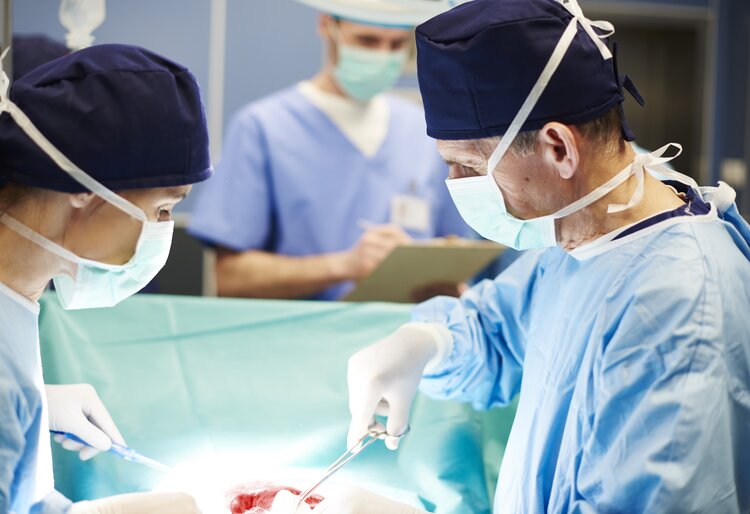Surgery Center Expectations and Preparation
Getting ready for an upcoming surgery can be stressful, clear up any concerns you may have with help from the experts at Midwest Nephrology. We’ll make sure you are coming in for your surgery confident and well informed. Learn more about what to expect before your surgery, from the days leading up to your surgery to the day of and day after your surgery.

HOW TO PREPARE FOR SURGERY
Be prepared for a quick and convenient surgery that should only last 45 minutes to 1 hour. Feel free to bring a family member with you for support and ride home after your surgery. You can’t go home by yourself, even in a taxi or by van transport. So make sure to have a family member or friend available to pick you up post-surgery.
Before you arrive for your surgery, a registered nurse will ask you questions, walk you through your schedule, and can help clear up any additional questions you may have on the day. Make sure to notify your assigned registered nurse if you are taking any anticoagulants (also called blood thinners) such as Aspirin, Plavix, Coumadin (Warfarin). They will check with your kidney specialist to see if you need to stop your medicine and if it’s safe for you to stop these medicines before your procedure.
Also, make sure to tell the registered nurse if you are allergic to contrast dye. Once all their questions are answered, the registered nurse will ask your doctor to order medicine for you to take the day before your procedure. Once the medicine is ordered, you may need to pick it up at your local pharmacy and will be instructed when to take this medicine.
Make sure to bring all of your medicines and a list of all of your medicines with you to your procedure. Remember, don’t eat or drink anything 6 hours before your procedure. If you need to take medicine, take it with only a sip of water.
AFTER YOU ARRIVE FOR SURGERY
Once you arrive for your surgery, you’ll need to check-in. At this point, the doctor will explain the procedure and answer your questions. After fully understanding the procedure, the doctor will ask you to sign a consent form. Signing this form means you agree to have the procedure.
Leading up to your surgery, you will be asked to change into a hospital gown and you’ll be asked additional questions about your health and medicine history. After this point, the following will proceed:
- They will bring you into the procedure room and ask you to lie on a table with machines all around you. We connect you to a monitor that shows your blood pressure, heart rate, and oxygen level.
- The nurses may give you oxygen and medicine to help you relax.
- They will cover you with sterile (clean) drapes from your shoulders to your feet.
- The doctor places your fistula or graft arm out on a small table and cleans your skin. It may feel cold and wet.
- The doctor injects some medicine to numb the area they will check on your fistula or graft.
- Once your skin is numb, your doctor places a tiny catheter (tube) in your fistula or graft. This tube is similar to the needle used during dialysis. The doctor then injects contrast dye into the tube, so they can see what is happening to your fistula or graft on x-rays.
- If your fistula or graft has stopped working, your doctor may inject blood thinners into the tube.
- If they find a narrowing, your doctor puts a thin wire with a balloon at the end of it into the tube. When the balloon is inflated, it stretches the narrowing. You may feel some pressure when this happens.
AFTER SURGERY INSTRUCTIONS
It is important that you relax for the rest of the day. You can start to eat and drink as usual. Make sure to follow all your doctor’s and specialist’s orders and recommendations. They’ll instruct you with any additional post-surgery needs like medication, wound cleaning, or pain management advice. Make sure that for the following 24 hours after your procedure you:
- DON’T drive or use any heavy machines
- DON’T make any legal or financial decisions
- DON’T sign any papers, don’t drink alcohol to take any medicines that make you drowsy (for example, sedatives or tranquilizers)
- DON’T lift anything heavier than a 2-liter pop bottle
- DON’T wear tight clothes or jewelry that will press on your wound
After the 24 hours are up, you can return to your usual activities. You may have some pain, mild swelling, and bruising at your puncture site. This is normal and should improve in a few days. If you have any questions or concerns, don’t hesitate to contact our team of specialized kidney doctors who are ready to help.
CONTACT MIDWEST NEPHROLOGY ASSOCIATES TODAY
Have any questions or concerns? Our dedicated team of physicians and certified staff are here to help answer all your questions and can help set up an appointment for you or a loved one. Contact Midwest Nephrology Associates for more information on Kidney Cancer and for help finding a treatment that works best for you.